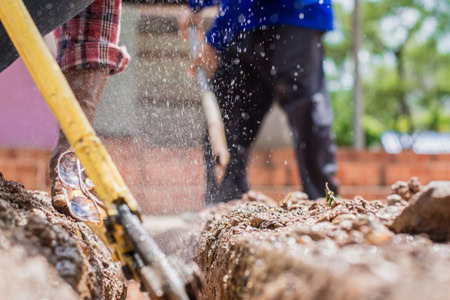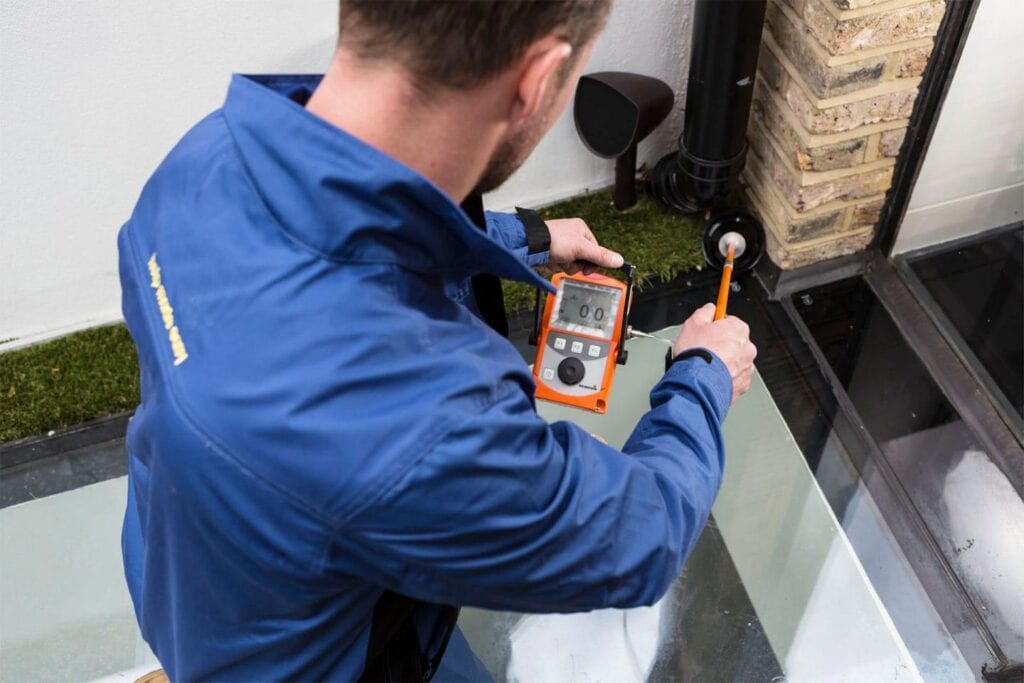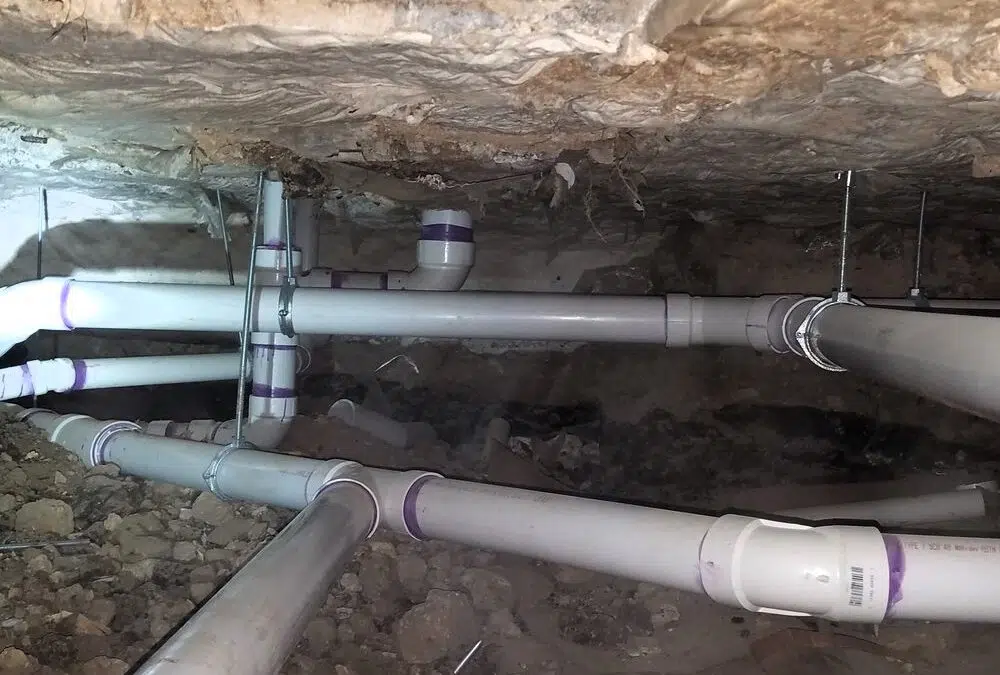Tunneling for underslab plumbing is a method that plumbers use to access pipes located underneath a home’s foundation without having to tear through flooring or disrupt the entire house. This technique involves creating tunnels under the slab, allowing plumbing repairs to be made with minimal disturbance. It’s often necessary when plumbing issues arise in areas that are otherwise difficult to reach, such as pipes buried deep beneath the concrete foundation of a home. The process not only saves time but also reduces the damage that might occur if traditional methods were used.
In the next sections, we’ll explore why tunneling is used, when it’s necessary, and what makes it a preferred method for plumbers. Understanding this will help homeowners know when they should consider tunneling for their plumbing needs. Let’s dive into the details of why tunneling might be the best solution.
Why Tunneling for Underslab Plumbing Is Effective
Tunneling for underslab plumbing isn’t just a clever solution; it’s often the only way to handle severe plumbing problems under a concrete foundation without major disruption. Experienced plumbers know that traditional repairs would mean tearing through floors, which can be costly, time-consuming, and inconvenient for homeowners. By using tunneling, they can access the damaged pipes directly.
A homeowner who experienced repeated leaks in their home’s underslab plumbing found that traditional methods were impractical. After consulting with experts, tunneling was recommended, and the job was done without disturbing the rest of the house.
- Saves time and money by reducing the need for demolition
- Allows for targeted repairs with minimal disruption
- Prevents the need for replacing expensive flooring or concrete
When Tunneling for Underslab Plumbing Is Necessary
There are certain situations when tunneling is not just a good option, but a necessity. Homes built on slab foundations are particularly vulnerable to underslab plumbing issues, especially older homes where pipes have deteriorated over time. Water leaks, sewage backups, and other plumbing disasters often occur below the surface, making tunneling a practical choice.
A homeowner may notice signs like damp spots on the floor, a sudden spike in water bills, or even unusual odors. These are often indicators of plumbing issues beneath the slab, which is when plumbers turn to tunneling.
- Water leaks detected under the slab
- Foundation shifts causing pipe damage
- Sewage backups that originate from underslab pipes
How Plumbers Use Tunneling for Underslab Plumbing
Plumbers who specialize in tunneling have specific techniques and tools at their disposal. The process starts with digging tunnels around the perimeter of the slab, allowing access to the plumbing beneath without breaking through the foundation. This method ensures that only the affected pipes are repaired or replaced, avoiding unnecessary work.
Skilled plumbers make sure the tunnel is wide enough for them to safely reach and work on the pipes, often using shovels and specialized equipment. The excavation is carefully monitored to prevent any damage to the foundation or surrounding structures.
- Careful excavation ensures the home’s foundation remains stable
- Plumbers access only the necessary parts of the plumbing system
- Specialized equipment minimizes disruption to the surrounding area

Signs That Tunneling for Underslab Plumbing Might Be Needed
It’s not always easy to know when tunneling might be necessary. However, some common signs could indicate that a problem is lurking beneath your foundation. Many homeowners first notice unusual damp spots on their floors or experience a sudden increase in their water bill. In these cases, the problem is often deep within the underslab plumbing.
By calling a professional plumber early, you can avoid more extensive damage to your home. Tunneling is often recommended when the problem is widespread, and pinpointing the exact issue is tricky.
- Unexplained damp spots in the home
- Noticeable cracks in the foundation or walls
- Unusual odors coming from the floors
The Cost of Tunneling for Underslab Plumbing
The cost of tunneling can vary widely depending on the extent of the work needed and the depth of the tunnels. On average, homeowners might expect to pay anywhere from a few thousand dollars to tens of thousands for large-scale projects. It’s an investment, but when compared to tearing up floors and foundations, tunneling often turns out to be the more economical choice.
Working with an experienced plumber who specializes in tunneling can help keep costs under control. Many companies offer financing options, making it easier for homeowners to manage these expenses.
- Costs depend on the length and depth of the tunnels
- Many plumbing companies offer financing options
- Tunneling often saves money compared to traditional excavation methods
Choosing the Right Plumber for Tunneling
Not every plumber is equipped to handle tunneling for underslab plumbing. It’s important to choose a professional with experience in this specialized field. Look for plumbers who are licensed, insured, and have a track record of successful tunneling projects. A good plumber will conduct a thorough inspection and provide a detailed estimate before any work begins.
When selecting a plumber for tunneling, it’s crucial to ask the right questions. Make sure they have the proper tools and expertise, and ask for references from previous clients.
- Ensure the plumber is licensed and insured
- Look for experience in tunneling projects
- Ask for references and check reviews

Key Takeaways for Tunneling and Underslab Plumbing
Tunneling for underslab plumbing is an effective and minimally invasive way to address serious plumbing issues without tearing up floors and foundations. It’s a method that plumbers turn to when access to pipes under the slab is necessary, saving both time and money for homeowners. Understanding the situations when tunneling is needed and how it’s performed helps homeowners make informed decisions about their plumbing needs.
- Tunneling is often necessary for deep plumbing issues under the slab
- It prevents the need for costly floor and foundation repairs
- Experienced plumbers use tunneling to minimize disruption
Frequently Asked Questions about Tunneling for Underslab Plumbing
1. How long does tunneling for underslab plumbing take?
The time it takes to complete tunneling can vary based on the size of the project. Smaller repairs might be completed in a day, while larger jobs could take several days.
2. Is tunneling safe for my foundation?
Yes, when done by experienced plumbers, tunneling is a safe method that avoids damaging your foundation. Careful excavation techniques are used to ensure stability.
3. Can tunneling be used for all types of plumbing repairs?
Tunneling is typically used for major plumbing issues under the slab, such as leaks or pipe replacements. For minor repairs, other methods may be more appropriate.
4. Will my insurance cover the cost of tunneling?
Homeowner’s insurance policies vary, so it’s important to check with your provider. Some policies cover certain plumbing repairs, but tunneling might not be fully covered.
5. How do I know if tunneling is the best option for my home?
If you’re experiencing plumbing issues under a slab foundation, consult with a professional plumber who specializes in tunneling. They can assess your situation and recommend the best course of action.

